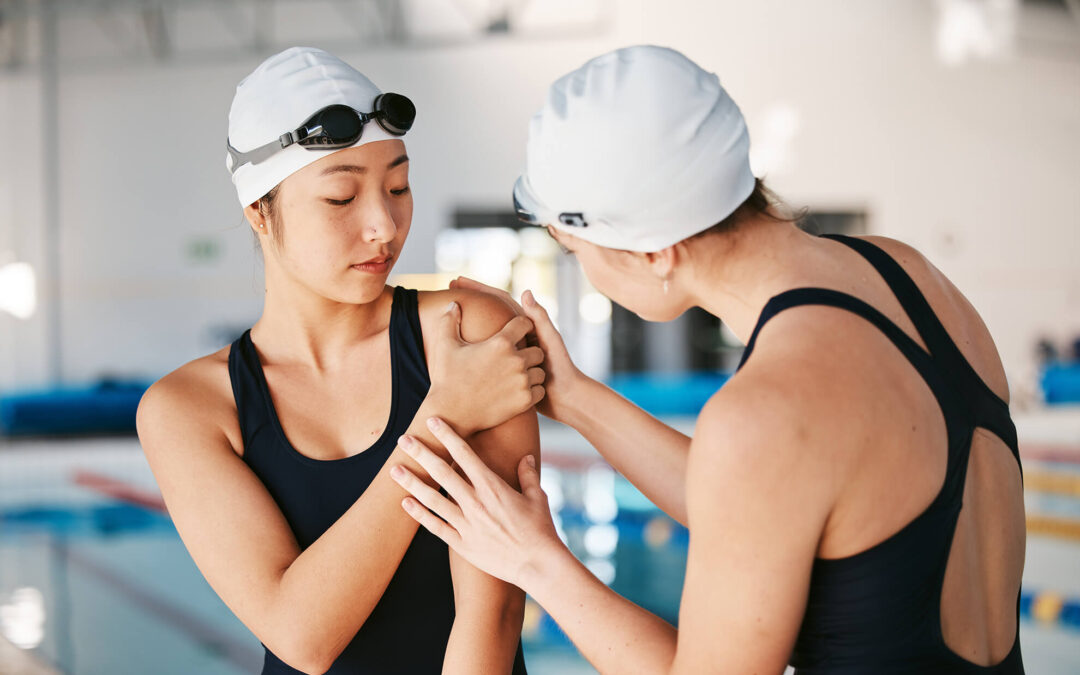Swimming is a low-impact sport enjoyed by people of all ages, but it’s not entirely risk-free. Repetitive strokes and prolonged training sessions can lead to swimming injuries that reduce your performance in the water and affect your everyday life. Working with our dedicated swimming physiotherapist in Redcliffe, you’ll recover from your injuries faster and build resilience in and out of the water. Here are the top five swimming injuries we see at our Scarborough clinic, along with the ways we support your recovery.
Shoulder Impingement
Repeated overhead strokes can pinch your rotator cuff tendons and bursa beneath the bony arch of your shoulder. The resulting irritation causes painful impingement, especially when combined with fatigue, overtraining, or errors in stroke technique.
Prevention tips include –
- Strengthening your shoulder and back muscles.
- Balancing your training loads with adequate rest.
- Working with a coach to refine your stroke technique.
In Redcliffe, our swimming physiotherapist guides you through strengthening programs and hands-on treatments to relieve your pain and prevent its recurrence.
Swimmer’s Knee
Breaststroke places heavy strain on your inner knee, where the repetitive whip-like kick can irritate the ligaments and tendons in the area. This irritation is often intensified by tight hips or weak glute muscles that fail to support proper alignment during the stroke.
Prevention tips include –
- Adding exercises that improve your hip flexibility and range of motion.
- Strengthening your glute muscles to reduce strain on your knees.
- Mixing up strokes to avoid repetitive strain on the same joint.
Our swimming physiotherapist provides targeted exercises and offers practical training advice to help you manage this condition and support your long-term recovery.
Lower Back Strain
Butterfly and freestyle put extra pressure on your lower back because of the repeated arching motion through your spine. When your core muscles aren’t strong enough or there isn’t enough recovery time between sessions, that pressure can build into stiffness and pain in and out of the pool.
Prevention tips include –
- Strengthening your core muscles for better stability in the water.
- Practising correct kicking technique to limit excessive arching.
- Allowing time for recovery and avoiding overtraining.
Our swimming physiotherapist provides exercises that strengthen your core muscles, reduce pain, and lower the likelihood of the problem returning.
Neck Pain
Neck discomfort often develops when you repeatedly breathe to one side and hold your head in the wrong position during long freestyle sessions. Over-rotation and limited flexibility can make it worse, leaving your neck tight, sore, and more likely to become a chronic problem.
Prevention tips include –
- Alternating breathing sides to reduce uneven strain on your neck.
- Stretching regularly to improve the flexibility of your neck and shoulders.
- Paying attention to your posture both in and out of the pool.
At Scarborough Physio and Health, we use a combination of hands-on therapy and tailored exercises to improve alignment, ease tension, and reduce the risk of swimming injuries like neck pain from coming back.
Hip Inflammation
The repetitive kicking motion in breaststroke and butterfly places continuous stress on your hip flexors and surrounding tissues. When combined with overtraining or tightness and stiffness in the hips, this strain can lead to painful inflammation in the front of your hip or groin.
Prevention tips include –
- Performing active warm-ups to loosen your hips and muscles before swimming.
- Strengthening your hip and core muscles for better support.
- Using stretches and simple exercises to keep your hips flexible and reduce strain.
We’ll provide you with a plan that addresses muscle imbalances, reduces tightness, and strengthens your hips—lowering your risk of ongoing problems.
How Scarborough Physio and Health Can Help
Swimming injuries often develop gradually, making early treatment and prevention important. Our swimming physiotherapist in Redcliffe helps you move better, stay pain-free, and enjoy your time in the water without worrying about setbacks. Book an appointment at our Redcliffe clinic today, or call our friendly admin team on 07 3880 1649 and we’ll help you recover faster and get back to enjoying the water as soon as possible.

